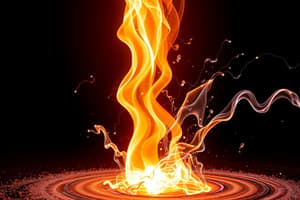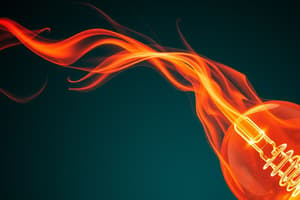Podcast
Questions and Answers
What is kinetic energy primarily associated with?
What is kinetic energy primarily associated with?
- The energy stored in chemical bonds
- The energy of objects in motion (correct)
- The energy of an object at rest
- The energy transferred by sound waves
How is chemical energy transformed in a car engine?
How is chemical energy transformed in a car engine?
- It is converted into thermal energy only
- It creates sound energy that helps in vehicle movement
- It is converted directly into electrical energy
- It is transformed into kinetic energy to move the vehicle (correct)
What does the first law of thermodynamics state about energy in a closed system?
What does the first law of thermodynamics state about energy in a closed system?
- The energy remains constant despite transformations (correct)
- Energy can be created or destroyed
- Energy changes forms but cannot be measured
- Energy can only be converted to thermal energy
What is thermal energy essentially synonymous with?
What is thermal energy essentially synonymous with?
In terms of energy measurement, what is defined as one joule?
In terms of energy measurement, what is defined as one joule?
What is the unit of power when measuring energy usage?
What is the unit of power when measuring energy usage?
Which of the following explains the process of sound energy?
Which of the following explains the process of sound energy?
Which type of energy can be defined as the energy of position?
Which type of energy can be defined as the energy of position?
What tool can be used to measure sound energy levels?
What tool can be used to measure sound energy levels?
What happens when energy is transferred from one form to another?
What happens when energy is transferred from one form to another?
Flashcards
Kinetic Energy
Kinetic Energy
The energy of motion. Examples include a rushing river and spinning tornadoes.
Potential Energy
Potential Energy
The ability to do work. Examples include a rock at the top of a hill and a stretched rubber band.
Electrical Energy
Electrical Energy
Energy carried by the flow of charged particles, such as electrons.
Thermal Energy
Thermal Energy
Signup and view all the flashcards
Chemical Energy
Chemical Energy
Signup and view all the flashcards
Sound Energy
Sound Energy
Signup and view all the flashcards
Radiant Energy
Radiant Energy
Signup and view all the flashcards
Conservation of Energy
Conservation of Energy
Signup and view all the flashcards
Work
Work
Signup and view all the flashcards
Power
Power
Signup and view all the flashcards
Study Notes
Types of Energy
- Energy cannot be created or destroyed, only transformed
- The amount of energy in the universe remains constant
- Energy is transferred from one object to another, changing speed and temperature
Kinetic Energy
- The energy of moving objects
- Examples include a rushing river and a spinning tornado
Potential Energy
- The energy an object has due to its position or stored condition
- An object has the capacity to create other energy types
- Examples include a storm cloud (converting to electrical energy) and water at the top of a waterfall (converting to kinetic energy)
Electrical Energy
- Carried by an electric current (flow of charged particles)
- Useful for transporting energy from one location to another
Thermal Energy
- Another name for heat
- Measures the kinetic energy of atoms and molecules
- The faster the atoms move, the more heat generated
Chemical Energy
- Potential energy stored in the bonds between atoms
- Released when chemical reactions occur, transforming into other forms like electricity
- Example: Burning gasoline to create kinetic energy in a car
Sound Energy
- Carried by waves through various mediums (air, liquids, solids)
- Generated by vibrating objects
Radiant Energy
- Transported by radiation
- Light is a form of radiant energy, along with infrared, microwaves, and X-rays
- Radiations carry specific energy amounts and can pass through different mediums
Measuring Energy
- Scientists use the term "work" to describe the amount of energy given to or taken from an object
- Work involves a force acting on an object, moving it a certain distance
- The unit for measuring energy is the joule (J)
- One joule is roughly the energy needed to lift three apples or move one pound (.45 kg) a foot (0.3 m)
Tools of the Trade
- A sound pressure level (SPL) meter app can measure sound energy (decibels)
Conservation of Energy
- Energy transformations follow the laws of thermodynamics
- The amount of energy remains constant, changing from one form to another
- Example: Chemical energy from food is converted into kinetic energy (for cycling) and thermal energy (body warmth)
Personality Plus
- James Prescott Joule experimented with different methods to heat water, finding that the energy needed was the same regardless of the methods.
- The joule, a unit of energy, is named after him.
Powering Up
- The power is calculated by dividing the energy used by the time it took to use it.
- Units of power are watts (W)
Try This
- An experiment to calculate a person's power involves measuring weight, vertical height of stairs, and running up the stairs to calculate time and energy to lift one's body. The amount of energy divided by the time required gives power.
Studying That Suits You
Use AI to generate personalized quizzes and flashcards to suit your learning preferences.




